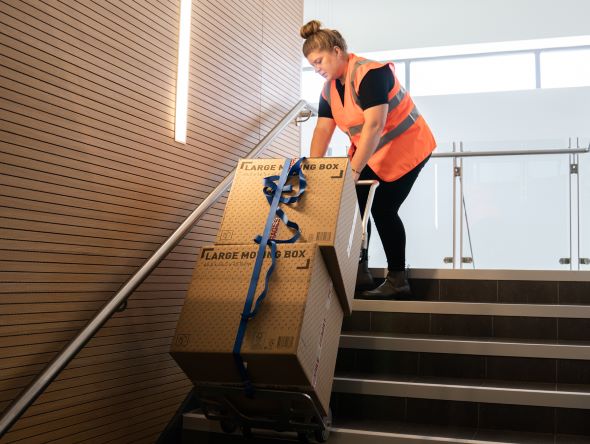Putting the last mile first in 2022
15th November 2021

Whilst hard to believe that it’s almost two years since we first heard about Covid-19 with uncertainty remaining about its longer-term effects on society, one thing appears absolutely clear: the pandemic has influenced consumer habits to such a degree that the upward trend in online shopping is most likely irreversible, writes Graham Sharp, Managing Director of Stanley Handling.
Since the first lockdown in March 2020, the UK’s e-commerce sector has experienced the highest online sales growth in 13 years with total online sales growth for 2020 rising by almost 40% year-on-year. This change in customer behaviour, in part forced upon society due to Covid-19 restrictions, has put significant pressure on retailers to stock items and be able to deliver quickly, in many cases the next day, in order to remain competitive.
The impact of both the pandemic and Brexit on the supply chains across all sectors of industry continues to hamper the economic recovery and consumer sentiment, which has been widely documented. When it comes to last-mile delivery, retailers are faced with a range of issues, including but not limited to: driver shortages; single-person delivery; gender pay equality; ageing of workforce; and mitigation from Covid-19.
With the now ubiquitous Black Friday season and also Christmas imminent, the last-mile process is under enormous pressure and this year is likely to be one of the most challenging ever faced by retailers.
Whilst there has been massive investment and technological development in warehouse management systems over the past decade, such as in AI-based automation, robotics and data analytics, the supply chain industry has been under pressure to change more rapidly, as a result of higher volumes of orders and more demanding customer expectations.
Protecting staff from risk of injury through manual handling, whilst optimising operative efficiency and managing costs, is an area where innovation and smart thinking therefore needs to play a vital role.
In the USA, solutions implemented by businesses to protect staff have been shown to lower insurance premiums, as part of efforts to avoid the damaging effects of corporate litigation. In the UK, this approach is being taken by insurers to reduce the cost of motor insurance, by encouraging motorists and businesses to utilise vehicle dashcams and fleet-wide GPS trackers to reduce premiums. I would reasonably expect meaningful efforts to reduce personnel injury to positively impact on business insurance premiums over the coming years.
Even before the pandemic, the latest available statistics from the Health and Safety Executive (HSE) showed that improper manual handling costs the UK economy hundreds of millions of pounds each year with more than 480,000 injuries recorded. Musculoskeletal injuries account for over 40% of all work-related sickness and HSE data shows that more than 8.9 million working days are lost to this type of injury each year.
With job vacancies at an all-time high, businesses simply cannot afford to have staff off work as a consequence of not investing in equipment or processes designed to improve efficiency and minimise risk.
As a strategic business partner to retailers across the UK, Stanley has proven to add value through the provision of specially designed solutions. Following a successful trial of our equipment, we became a supply and maintenance partner to ASDA in 2021, which was the first supermarket to roll-out powered stair climbers to its urban delivery fleet.
Similarly, the use of innovative wearable devices which utilise artificial intelligence (AI) to measure forces on the body and identify hazardous actions are now being trialled. A major benefit of AI is that data can encourage employees to self-manage their wellbeing, whilst management can use it to implement wider business improvements.
In our experience of supporting customers with such technology, operatives can embed correct handling techniques into their working lives, reduce the risk of injury and help create a culture of safety and productivity.
Now more than ever, I would urge the logistics sector to consider innovative ways of helping tackle the challenges of the last mile.

